|
|
Con-tact: Science Fiction Convention Previews and Reports
Cadet's Log: 2006 Williamsburg Film Festival - FRIDAY
by Caroline Miniscule
Jan Merlin and Frankie Thomas speak about Tom Corbett, Space Cadet
After the performance of the radio play Tom Corbett, Space Cadet: Project Enigma, Jan Merlin and Frankie Thomas gave a talk, moderated by Bill Ruehlmann. They talked about how they had acquired their roles and their future careers.
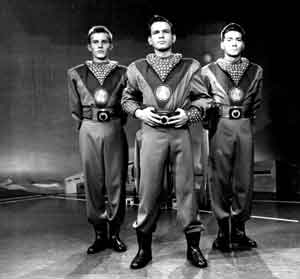 Jan Merlin as Roger Manning, Al Markim as Astro,and center, Frankie Thomas as Tom Corbett
Jan Merlin as Roger Manning, Al Markim as Astro,and center, Frankie Thomas as Tom Corbett |
Ruehlmann: Frankie, you came to performing through a distinguished theatrical family.
Frankie: Yes, I was very lucky. My father and mother were both in the business, my uncle and aunt too. But dad, you probably don?t recognize the name but you?d recognize the face. Among other things he was a star on Broadway. But in the latter part of his career he did 134 major motion pictures, and that sure beat me.
My parents, I might as well get this one in quick, did not believe in teaching actors. They did not believe in actors going to school. All they ever told me was: ?make it real.? And that?s been my little thing I?ve tried to do ever since. Which was a little hard, when you?ve got this fella on my right, you know, [Jan Merlin] but what the hell.
|
Ruehlmann: Was having professional parents a boon to you or an extra source of pressure because you had to live up to their expectations.
| Frankie: It was a definite boon. They never expected me...they didn?t push me into the business. My mother got a call, a casting call in New York. And she went to this studio, and the director of this play, Blanche Yurka, she was the most famous female star of Ibsen plays, and she said, Mona (that was my mother?s name), all of the characters in this play are much older than you, (now, I had gone with mother because she picked me up from school), and I was standing in the door, and Blanche looked up and said, ?But I can use the kid.? And that was my first job.?
In 1933, I did a play called Wednesday?s Child, [at the age of 12] which is the longest and they say the most difficult juvenile part ever written for a child, and that record still stands. And it was just a great part, I mean it was hard to miss. So right after we opened, to rather good notices I?m glad to say, RKO bought the play and they took me out to the coast to make the picture, and that was the beginning of...
Jan: I?ll interject here that when he did the picture, if you see the picture, you?ll see Frankie Thomas nestled in his screen father?s lap, who had a great big tummy [Edward Arnold], and he had a hearty laugh that he used in every movie he ever made, and little Frankie, scene stealer as he was, was patting him on the stomach and using the same laugh, and he was a very uncomfortable leading actor. |
Frankie's Movies
Wednesday's Child (1934)
A Dog of Flanders (1935)
Tim Tyler's Luck (1937)
Boys Town (1938)
Little Tough Guys in Society (1938)
Nancy Drew -- Detective (1938)
Nancy Drew... Reporter (1939)
Code of the Streets (1939)
Nancy Drew... Trouble Shooter (1939)
Angels Wash Their Faces (1939)
Nancy Drew and the Hidden Staircase (1939)
On Dress Parade (1939)
Invisible Stripes (1939)
One Foot in Heaven (1941)
Flying Cadets (1941)
Always in My Heart (1942)
The Major and the Minor (1942)
Full details of Frankie's movies and TV work (and Jan's) at www.imdb.com |
Frankie: You know, Jan, I?m not sure he ever caught on to that.
|
Jan: I think he did. He knew it..
Ruehlmann: When a youngster your age is the center of attention, and this play is playing, what did you do to goof off and become just an ordinary kid?
Frankie: I never wanted to be an ordinary kid. My career, my personal career, was to me the most wonderful thing in the world. Listening to those great stories of character actors. There?s an old saying that the inside story, that?s the one that?s interesting. And I just lived on that. After a while I got thinking that I was part of those stories, and that was my fun time. Other kids were out playing football, and all that kind of stuff, but I was perfectly happy...
Ruehlmann: How about you, Jan? You didn?t have a theatrical family background, you came through other venues. |
 Jan Merlin pointing out that Frankie was a scene stealer
Jan Merlin pointing out that Frankie was a scene stealer |
Jan: In a round about way, the theater started early in my life. I was born in a basement apartment of a Russian Orthodox church. My parents were the caretakers. And in back of our apartment underneath the church was a large auditorium with a stage on it, and they used to do Russian plays there...the actors for the plays would come into our kitchen and get made up, then they?d go out there and do these plays. I remember the plays...not really well...I was only a little kid, I was three or four, when I began to first notice that they were carrying roosters around and junk around the stage, and that was sort of the touch of theater then, but I didn?t really get into it until after the war was over.
We came on into Japan, we were the first ship into Hiroshima, and we stayed in that area for quite a while. And on the other side of the hills surrounding Hiroshima the blast had made no effect, I encountered a little village that had a theater in it. I?d be sent to ashore to do shore patrol, and I was watching an old man who was on his knees on the ground teaching a child, teaching him how to croon something or other in Japanese and he was obviously teaching him a role. And I got interested in that - when I got a chance I?d go to the theater when they were performing. This audience would be sitting on the ground before the stage eating tangerines and nuts...the performers would be performing..and it was amazing to me that here was this enormous destruction, right there close by, and yet this magical theater existed and drew the people to take them out of the destruction, and take them into another world. That stuck with me.
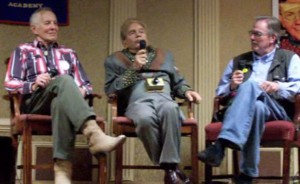
Both Jan Merlin and Frankie Thomas were in the Navy during WWII
|
When I got back home, nobody needed a torpedoman after 1946. I got a job with a summer stock theater building sets because I could paint, I could draw. And I watched the actors all summer and thought, I can do that. And a fella told me about a place called the Neighborhood Playhouse School of the Theater and suggested I go see them. I went to see them, applied as a student. You know, fresh out of the Navy, you?ve still got a chip on your shoulder, the war is still with you.
They had a fellow called Sanford Meisner who was supposed to be the finest teacher in all of the United States. To me he was just a little guy with glasses, you know. He looked at me and said, ?Why do you want to be an actor??
|
I couldn?t answer him. He thought that was odd, but he was intrigued by it and I was accepted for the school. Dick Boone was there, Eli Wallach had been there. A bunch of us were there - a lot of us were GIs fresh out of service, and all the girls were fresh out of high school and early college, and they were pretty and they all wanted to be actresses and here were all these raunchy guys who were just delighted to learn how to act and dance - Martha Graham had her class there.
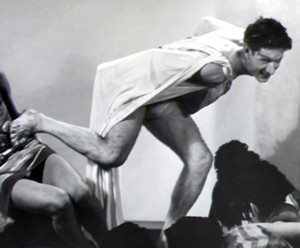
Richard Boone kicking Jan Merlin in the ribs
(Click for enlarged, entire photo)
Photo courtesy Jan Merlin |
Dick Boone and I needed money one time - we needed money all the time, we were on the 52/20 club, you got $20 a week as long as you were going to school from the government, the government paid for the schooling.
One of the assistants to Martha Graham had a little dance company of her own, and she asked Dick Boone and myself whether we?d like to be in her company, and make $23 for the show. We said ?Sure.? We studied with her for whatever the rehearsals were. Dick was dressed in kind of a toga and had lines to say and all kinds of gesturing to do, and I was dressed in some kind of crazy wig with an Aztec sort of outfit, and I have a great picture of Dick Boone in that drag outfit kicking me in the side, and the rest of us characters in a circle. And we got rotten reviews from the dance magazine, and we never did it again, but Dick Boone at one time was a ?modern dancer?. And his son didn?t know that, and I gave him that picture of him doing that, and the review he got from the dance magazine....
|
File VersionJan: But, out of this school - you know it was wonderful. Here I was gathering a career. I worked in summer stock as an actor and as a stage designer, designed the sets, built them, and also got parts in it, but by the end of the summer I was pretty broke, I was down to about 15 cents.?
Jan on Broadway
sWarning: Restoring an older version will overwrite the current file without backing it up. New ArchiveArchive Name Back to Control PanelWeb Site .htaccess Editor But by the end of the summer I was pretty broke. I was down to my last fifteen cents. Somebody from the school called up and said Josh Logan - he had directed Mr. Roberts, and that was the biggest hit on Broadway - he was up at the Albin Theater and he was going to do another show. And the secretary from the school said, ?They?re looking for military types, so why don?t you go up there and see if you can audition??
So I spent ten of my fifteen cents on the subway to get up to the Albin Theater, and about 4,000 actors were lined up outside the stage door of the theater, and they got us through in little groups of about ten or fifteen, and they?d be narrowed down, they?d say some to stay and some to go. Finally we were in smaller groups, and finally I was in a group of four. And I was up on that stage and they asked us to take off our shirts to show what our physiques were like, and then it was quiet out there in the dark. And then finally this man came walking up to the apron of the stage. It was Josh Logan. He looked up at me and said, ?I?ve got a boy leaving the cast of Mr. Roberts. Which show would you like to be in, Mr. Roberts or South Pacific? I said, ?Mr. Roberts. I can?t sing.?
| ?Have you seen it?? ?No, I couldn?t afford to.? ?Well, you?ll see it tonight. Tomorrow you?ll rehearse with the stage manager. You?ll go on tomorrow night.?
Stayed with that for two years. And that?s how I got into show business.
After two years working in the most successful play on Broadway, the cast asked for a raise and was refused. They all started looking for new jobs.
Jan: I heard that they were casting for some kind of a ?space show? [emphasizes the phrase, which got a laugh.]
Jan continued with a grin. |
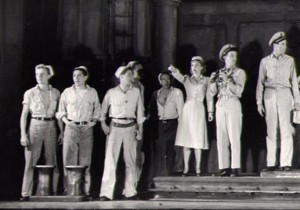
Jan Merlin far left, Henry Fonda far right, Mr. Roberts.
(Click for enlarged, entire photo)
Photo courtesy Jan Merlin |
Tom Corbett
Jan: I didn?t know anything about television, I hadn?t even seen television. I went up to this little place called Rockhill Radio. Went in. I had the crew haircut from the show [Mr. Roberts. They looked at me, and talked to each other. I thought, ?I don?t have a chance, here. I don?t know what?s going on.? I could hear them say, ?Not Tom. Not him.? And then they said, ?would you read this part,? and they handed me a part and it was Roger. I began to read it and I hadn?t gotten about halfway through a page when they said, ?Okay, you?re going to be Roger Manning. And would you mind reading with the other people that come in, we?re going to get two more people, we?re going to get Tom and then we?re going to get Astro. And I stayed, and for days I would come in and I would read other actors. We hired Astro next....Eventually we saw him [Frankie] come in, and that was it. He was Tom.
| Frankie: To a certain extent Jan studied the business. You know, he did go to school. I never went to school at all and didn?t quite believe in it. But we all ended up doing just fine. But I remember that day. [Tom] was originally, I say this - some of you may not be interested in what [Tom] was, but I?ve got my boys here [the Solar Guard fan club], and I?ve got to tell them about it. Tom was originally the junior cadet, and Astro and Roger sort of took care of him. I remember that day well. It was about three in the afternoon. Jack Lemmon had read for the part. God, every actor in town. And I walked in, and something happened. The producer, Mort Abrams, said, ?Well, Frank could you line up with these two chaps. And there was Astro and there was Roger. And I did and they said, ?That?s it. And we?re going to change the concept. You?re the senior cadet. And it just happened...I didn?t read anything, they just said, ?That?s it.? And it was ?that?s it?, for five years, because we had a wonderful time playing - working together, my old buddy here. [Puts arm around Merlin?s shoulder.]
|
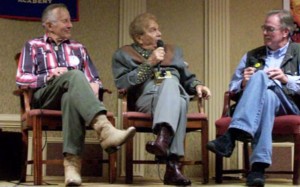
Jan, Frankie, moderator Ruehlmann |
Ruehlmann: I?ll ask just one more question, as we?ve gotten you to the threshold of far reaches of space, but also to the beginning of a magical new medium, and I wanted to ask you, thinking back, at the time were you aware this was going to take over the cosmos in a lot of ways?
Frankie: Not at the beginning. But we had a technical director, Willy Ley, who [was] the best friend of [Wernher von Braun]...he kept all of our scripts within the realm of scientific possibility. And I was writing a few of them then, and we got to know him pretty well, and picked up a lot of stuff, and that?s where we got the idea that maybe this was the beginning. I asked Willy once, ?When do you think we can get to the moon, Willy?? and he said, ?Ten years, easy...and he was right. Don?t you think so, Roger??
Jan: ...He was a stickler for trying to keep us accurate on most of the space stuff.? commented Jan. ?The trouble was he also gave us a lot of technical phrases to say, which I might tell you as far as Roger Manning was concerned they were the most difficult things in the world to handle. It got pretty nutty sometimes...
| ...I started out as one of the gung ho cadets, and...because of all those words that he gave us, I became a kind of a heavy. At one point Captain Strong was floating out in space and needed to be rescued. And Tom and Astro wanted to go out and rescue him, and Roger, being Roger, said ?No, let?s go back to the Space Academy first and get help, and we?ll rescue him. And I had a bunch of gobbledy gook to explain why. And the cue for all this came from Astro. On air, coast to coast. Here?s Captain Strong floating out in space, we don?t know if he?s going to die or not, and Astro says, ?You mean to say you?d leave Captain Strong out there to die?!? and I looked at him and I couldn?t remember a word and I said, ?Why not?!!? |
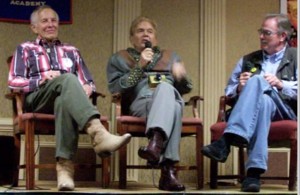 |
Archive Gateway Disk Usage FTPLots of time Tom and I ...Tom - Frank!- and I would be doing a radio script. Mostly it happened in the radio scripts. Sometimes my mind would drift. I?d start listening to what the other guys-I?d be watching them while they were doing their acting, and I?d take my eyes off the script and lose my place. And all of a sudden I?d hear him saying my line, and..I?d say his line, and he?s say my line, and finally we?d get it back to where we were saying the proper lines. But I learned that from him, because during the television shows he would always do that with the actors we brought in, who were always nervous as heck because they hadn?t done this kind of work - television - and they weren?t used to the kind of pace we had, and Frank knew how to fix it. He?d say their lines for them.?
FileManager FrontPage Extensions GoogleFrankie: It actually happened that we did - I?m trying to think of the name of the actor, whose very well known now - we did a whole scene backwards. He was playing ?Joe Yaker? head of the Venusian Mud Lake Tunnel Project, I remember that bit, and they had this fellow from Newark, he?d been a prize fighter, and he was very nervous, poor guy. And he learned the whole script. He wasn?t going to miss anything. He learned my lines, and his lines, and Strong?s lines, and I walked in to make the entrance and he looked up at me and casually said my line. Thank God I?d written the script. So I said his line. We went through the whole thing, ended up, went into the commercial, producer walks up and says, ?Frank, that was a great scene.? He didn?t know the difference!
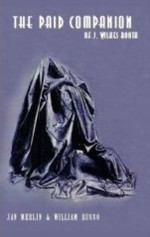
Jan Merlin's
latest book |
The writing careers of Frankie Thomas and Jan Merlin:
At one point they talked about writing their books - Jan has had over nine books published, his latest being The Paid Companion of John Wilkes Booth, and Frankie has written several books featuring Sherlock Holmes.
Merlin was displeased with the way Avon marketed one of his books (as a romance), so he re-acquired the rights to it, gave it back its original title, Ainoko and redid the cover. He also designed the covers for the re-issues of Frankie's books.
[Stay tuned for an interview/article about their writing careers in a future issue of The Thunder Child.] |
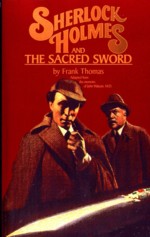
Frankie Thomas'
first Holmes book |
Someone asked if they realized the big influence they had in the kids all over the country, while the show was on the air.
Jan: We get more of that now, in a very astonishing and wonderful way. Frank and I just received, from a real astronomer, a man named Howard Bond, who sent us photographs taken by the Hubble telescope, of an exploding nova. And it shows the various gradations of that explosion so that as it opens up you can see within it the blackness and the other stars and other planets. You see into what is happening beyond the explosion. He sent a note with it that said, ?Had it not been for seeing Frank and you in Tom Corbett, Space Cadet, these photographs would not have happened.? And he thanked us for it.
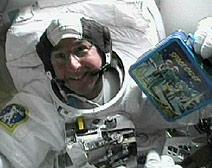
Astronaut Steve Robinson aboard the shuttle Discovery, 08/03/2005 |
My son works for NASA, and these astronauts...they?ll walk into his office and there?s a picture of the space cadets on the office wall, and they?ll look at that and they?ll say, ?Who?s that, where?d you get that?? and he?d say, ?Well, that?s my dad,? and they?re just astounded because they were led to become astronauts having seen the space cadets when they were kids.
Frankie: One fellow - I have newspaper clippings with pictures - he would not fly without the Tom Corbett lunchbox - it got to be such an item..and they did take it with him in space. |
Frankie continues: In one respect when I started Tom Corbett, my career was over. I had nowhere else to go. Wednesday?s Child took me to pictures, and I made 28 of them, I think. But what I did was, what I was fortunate enough to do - I would do a motion picture, (and there were a lot of good parts written for those days for young fellas), and I?d go back to New York, and by this time, thank God I was a star. So I did Dog of Flanders, and Man To Remember and Angels Wash their Faces...?
| Jan: Frankie played Ann Sheridan?s brother in one of his pictures [Angels Wash Their Faces (1939) and many years later I played her husband in her final picture. She never did another one again. We shot a picture in Africa called The Woman and the Hunter (1957). So it was odd that we both worked with her.
Frankie: Yeah, not too many people worked with her [in movies, she only made a handful]. She was a wonderful girl. But I kept going from Hollywood to New York and back again. And then, after the war (I was in the Navy, too) and after five years I got out and work was a little harder to find. There were a lot of fellows who?d stayed behind, you know. And I started doing radio and then branched into television. I did the first five-a-week television serial called A Woman To Remember, which was not successful, it only ran 26 weeks. But that got me going into TV. And I did most of the stuff around there. There was a lot of television in New York, it wasn?t out on the coast at all, not until about ?55. |
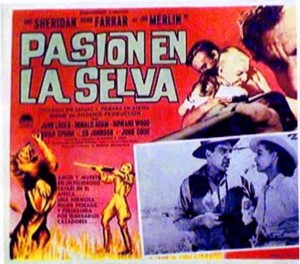
Spanish poster of The Woman and the Hunter |
Unfortunately at this point time ran out, and the Q&A session ended. However, fans could still go up and have their photos taken with Jan and Frankie.
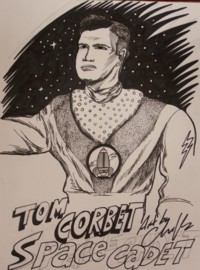
New Solar Guard cadet Chris Krieg drew this picture
of Frankie, and gave it to him after the talk.
(You can tell he's new - he forgot the last 'T' in Corbett!)
Return to:
 |
Click on the icons for new features in The Thunder Child.
Radiation Theater: 1950s Sci Fi Movies Discussion Boards
The Sand Rock Sentinel: Ripped From the Headlines of 1950s Sci Fi Films
|
 |
|









